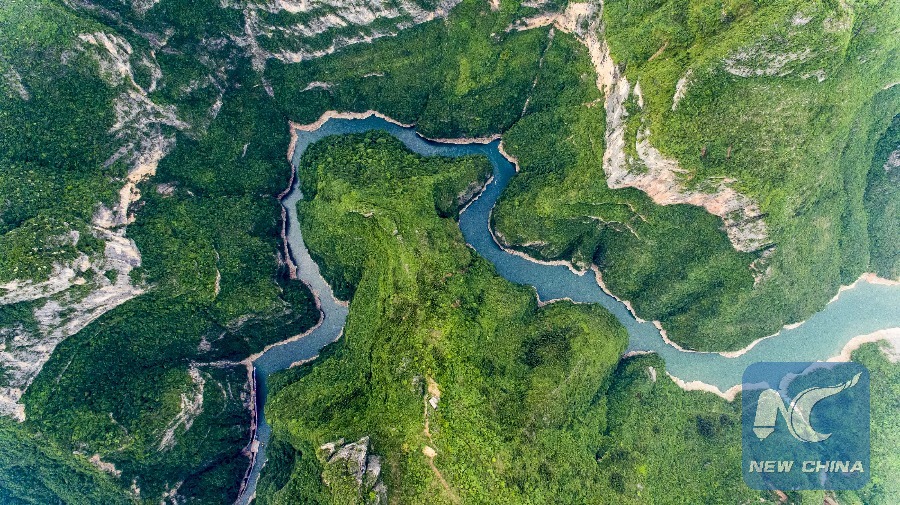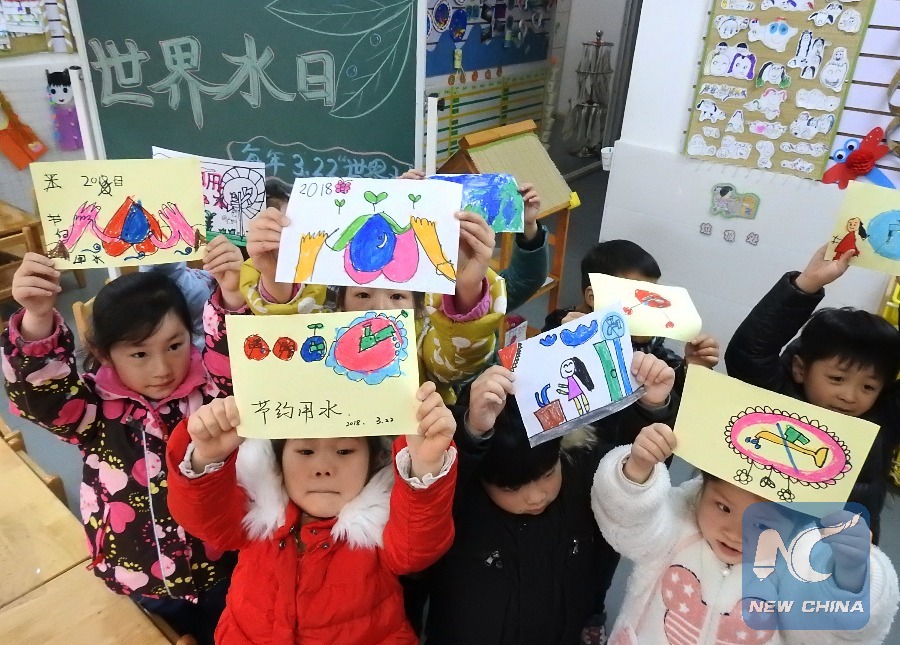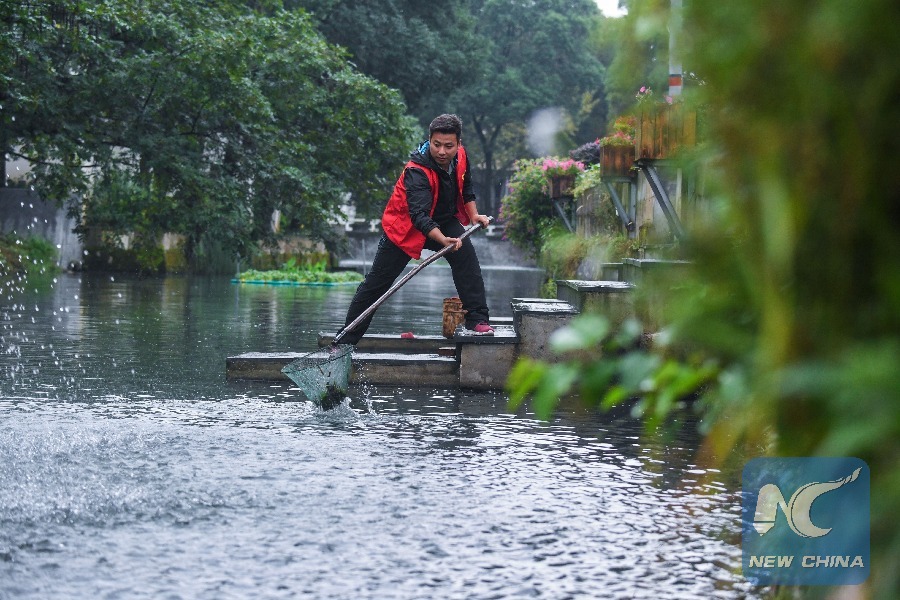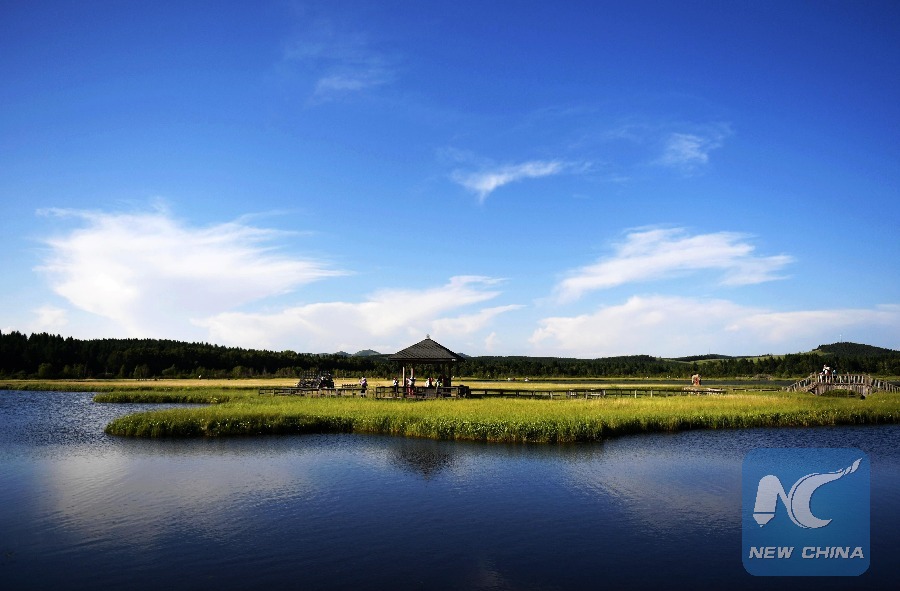
Aerial photo taken on May 10, 2017 shows the Shennyuxi scenic zone at the Wuxia Gorge of the Yangtze's Three Gorges area in southwest China. (Xinhua/Liu Chan)
BEIJING, March 23 (Xinhua) -- A week of saving water began in China Thursday, in celebration of this year's World Water Day, taking the country another step closer to realizing the dream of beautiful, green nation.
Following the creation of new environmental authorities, China is now better equipped to juggle growth and conservation.
"Let saving water be the task of all Chinese," the People's Daily said in a Thursday article.
Water shortages are particularly tough for China, as per capita water resources are less than a third of the world average. About two thirds of Chinese cities face water shortages to some extent.
To encourage people to think more deeply about their water supply, Binzhou City, Shandong Province on Thursday encouraged citizens to turn off their water for a few hours to find out exactly how a water shortage felt.

Children show their paintings themed on saving water at Haizhouwan Central Kindergarten in Lianyungang City, east China's Jiangsu Province, March 22, 2018, on the occasion of World Water Day. (Xinhua/Geng Yuhe)
In central China's Hunan province, a data base now allows local river chiefs tasked with fighting water pollution to access a wide range of information to help in their work.
Saving water, however, is only one thing China must work on to become a beautiful nation of clean air, clear water and green mountains. A week of saving water is definitely not enough.
That will require institutional reform and strong government action.
NEW INSTITUTIONS
Across the country, river chiefs, bay chiefs and lake chiefs are taking up their posts. Along China's longest inland river, the Tarim, in Xinjiang, 285 river chiefs have been appointed to be directly accountable for the quality of water under their supervision.

River chief Wang Jia clears away floating waste on a river in Changxing County, east China's Zhejiang Province, Oct. 12, 2017. (Xinhua/Xu Yu)
In Beijing, people are taking selfies in front of the Ministry of Environmental Protection, as it will soon be replaced. New ministries were recently approved by the national legislative session.
The Ministry of Ecological Environment will take charge of protection of fresh water, land, air and oceans. The Ministry of Natural Resources will be responsible for making overall planning and overseeing the development and protection of the natural resources.
These changes may be answers to long-term issues, including poorly defined government responsibilities, according to Minister of Ecological Environment Li Ganjie.
The government has played a dual-role as both competitor and referee for a long time and that problem should now be solved, Li told a press briefing over the weekend.
Li's ministry will consolidate powers to prevent pollution and protect the environment that used to be spread among various ministries.
AMBITIOUS GOALS
New ministries mean more detailed planning, but the journey to sustainable growth still will not be easy.
The government will do as much as it can to protect and restore ecosystems. It will set redlines for protection in the whole country. More than 6.6 million hectares of forests will be planted. Crop rotation and fallow land trials will be increased to two million hectares, and all before the end of this year.
By 2020, total annual water use should be under 670 billion cubic meters and water use per 10,000 yuan of GDP will be reduced by 23 percent of the 2015 level.
In the opinion of Erik Solheim, executive director of the United Nations Environment Programme, policy makers face either-or paradoxes to a seemingly impossible equation, namely, how to lift tens of millions of people out of poverty while protecting the environment.
For large economies, the balance between development and conservation is particularly tricky.
GROWING CONFIDENCE
Although environmental regulation of factories inevitably leads to pain, many companies have begun to feel the benefit of the new development model. The green development path has helped new energy vehicles in particular, but the effects can be seen across the board.
Poten Environment Group, a water treatment firm in Beijing, saw its revenue rise by more than 45 percent from 2012 to 2016, thanks to stricter environmental rules.
The level of PM2.5 in Beijing has dropped to its lowest level since 2013 when the national air pollution control campaign began. Across the country, average PM2.5 density in 338 cities fell by 6.5 percent last year. Photo taken on July 11, 2017 shows tourists visiting the Qixing Lake Scenic Area of the Saihanba State Forest Park in Weichang Man and Mongolian Autonomous County of Chengde City, north China's Hebei Province. (Xinhua/Wang Xiao)
Photo taken on July 11, 2017 shows tourists visiting the Qixing Lake Scenic Area of the Saihanba State Forest Park in Weichang Man and Mongolian Autonomous County of Chengde City, north China's Hebei Province. (Xinhua/Wang Xiao)
Li Ganjie said that the target for PM2.5 reduction could be raised as targets are being met faster than expected.
"Finally, the world is witnessing what may well turn out to be the definitive how-to guide on building a sustainable economy that works in complete harmony with the environment," Solheim wrote in an article in China Today, a multi-language magazine.
"For the larger economies, in most cases wealth has been built on unsustainable growth. That is about to change, and I'm convinced China will now lead the way," he wrote.
(By Xinhua writers Cheng Yunjie, Lu Yun and Lou Chen. Guan Guifeng in Beijing also contributes to the story.)

